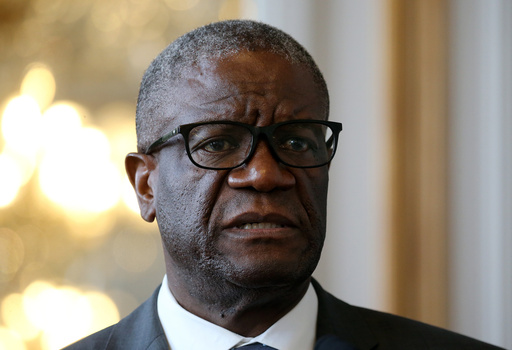
DRC Congo Dr. Denis Mukwege is received at the town hall of Bayonne, southwestern France, Thursday May 4, 2022. Congolese Nobel Peace Prize laureate Mukwege kicked off his campaign for president in next month’s election on Saturday, Nov. 25, 2023, promising to tackle corruption and the violent conflict ravaging communities in the country’s east. AP FILE PHOTO
GOMA, Congo — Congolese Nobel Peace Prize laureate Dr. Denis Mukwege kicked off his campaign for president in next month’s election on Saturday, promising to tackle corruption and the violent conflict ravaging communities in the country’s east.
The 68-year-old renowned medical doctor told a crowd of supporters in Bukavu city in the eastern South Kivu province that he would also end famine in Congo, a richly endowed but impoverished country battling high rates of poverty and hunger.
“This is the pillar of the work we are going to do to give back to the Congolese people their dignity and their value,” Mukwege told at least 2,000 people gathered in Bukavu, his hometown.
Mukwege was named the joint winner of the Nobel Peace Prize in 2018 for his work in supporting victims of sexual violence in the fighting in Congo through the Panzi Hospital he founded.
He is known for his yearslong activism in the country, surviving an assassination attempt in 2012 and facing death threats.
Mukwege is seeking to run in the Dec. 20 election against Congolese President Felix Tshisekedi — who is seeking reelection — and several other popular opposition figures, including Martin Fayulu, a former oil executive who lost to Thisekedi five years ago; businessman Moise Katumbi; and former Prime Minister Matata Ponyo.
“When you entrust me with the governance of this country, the first thing I want to do is to do everything to set up an army that will be structured and modernized,” he said. “If you vote well, your lives will improve and if you vote badly, you will still remain slaves.”
Fighting in eastern Congo has been simmering for decades as more than 120 groups fight for power, land and valuable mineral resources, while others try to defend their communities. But it spiked in late 2021 when the M23 rebel group, which had been largely dormant, resurfaced and started capturing territory.
Some of Mukwege’s supporters said they were optimistic he would win.
“He is a candidate who is a choice of the Congolese people because he is a candidate from civil society,” said Nabitu Aline, a supporter and resident of Bukavu. “We expect a lot from him, he is our hope.”